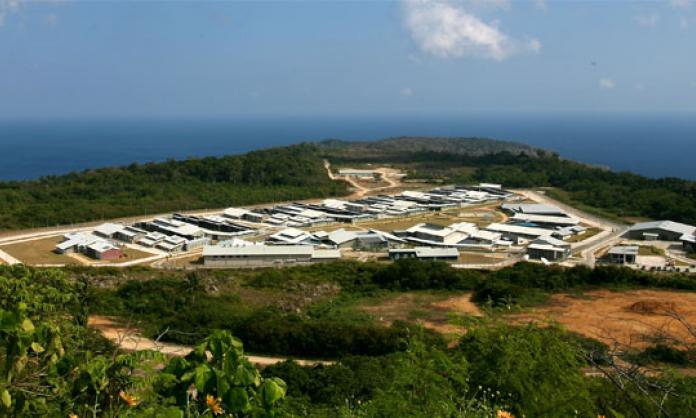“It should not ever be controversial to state, as a matter of policy and principle, that Australians have the right to decide who comes to this country, our country, and the manner in which they come.”
These are not the words of the notoriously racist ex-prime minister John Howard. They are those of another anti-refugee politician: Malcolm Turnbull. They were delivered when he was opposition leader in 2009. It was a parliamentary speech lauding the successes of Howard-era refugee policy and attacking the Rudd Labor government for losing “control of our borders”.
Since assuming the prime ministership, Turnbull has stayed true to form. The unspeakable crimes going on in Australia’s detention centres are now his crimes. The suffering of more than 1,500 men, women and children in Australia’s offshore hell-holes is now wholly of his making. And responsibility for the rampant sexual assaults, child abuse and self-harm of refugees and asylum seekers now rests squarely with him.
The treatment of Abyan, a 23-year old Somali woman, illustrates the sort of treatment refugees can expect under Turnbull’s supposedly more progressive leadership. The facts of Abyan’s case are well known: after reporting to guards that she had become pregnant as a result of rape, she requested an abortion.
So poor are the health care facilities and so restrictive are rights for women in Nauru, that in order to have the procedure, Abyan needed to be brought to Australia. After receiving no response from the immigration department for weeks, Abyan’s lawyers wrote directly to Turnbull and the immigration minister, outlining her situation and requesting action.
This letter was ignored. Only when Abyan’s lawyers subsequently went public via social media was the government forced to act, such was the public outcry.
But the government only compounded Abyan’s suffering. According to her lawyers, proper medical care and interpreting services were not provided when she was finally brought to Australia. Then, within hours of being notified of her lawyers’ intention to file an injunction to keep Abyan in the country to access appropriate medical treatment, the government secretly sent her back to Nauru, still pregnant.
The abusive nature of this traumatised woman’s treatment is self-evident and indefensible. It is the brutal human cost of Turnbull’s all-important “right to decide who comes to this country … and the manner in which they come”.
Abyan’s case exposes the rank hypocrisy inherent in Turnbull’s efforts to present himself as a forward thinking social progressive and opponent of violence against women.
While he and numerous other politicians blather on about how acts of everyday sexism committed by ordinary people contribute to the scourge of sexist violence, he simultaneously and ostentatiously denies appropriate care to a rape survivor, along with the numerous other victims of sexual violence and abuse in Australia’s detention system.
The clear message is that the vulnerable are not worthy of being treated with dignity or respect, especially not if they are women.
Turnbull cannot claim ignorance of the situation in Australian detention centres. Both the Human Rights Commission’s February report and the more recent Moss Review have documented the appalling conditions on Nauru, and the widespread sexual abuse of women and children there.
The HRC report found that in just over a year, there were 233 assaults involving children in Australian immigration detention and 33 incidents of sexual assault, most involving children. A further 128 children were found to have self-harmed.
According to the ABC, there have been at least 20 sexual assaults committed against asylum seekers on Nauru in the last year.
The Moss Review likewise documents numerous accounts of refugees suffering degrading abuse, including being forced to expose themselves to guards in order to gain access to showers.
All of this explains why Turnbull has upheld the ban on journalists visiting Nauru, and why he has in effect denied access even to the United Nations. UN Special Rapporteur on the human rights of migrants, François Crépeau, was scheduled to visit and report on conditions inside Australian detention centres in October. But the government declined to facilitate access to Nauru and refused to provide a guarantee that anyone who spoke to the UN wouldn’t face sanctions.
So desperate are the authorities to avoid any scrutiny of these hell-holes that in order to stymie a High Court challenge to the constitutionality of offshore detention, the Nauruan government recently declared all detainees formally “free” and gave an undertaking to process their claims within a week.
But according to Pamela Curr of the Asylum Seeker Resource Centre, this has not resulted in improved conditions for those detained because the Nauru township is extremely dangerous for refugees – there is a great deal of hostility to their presence on the island. Regardless, it is a prohibitive 75 to 90 minute walk from the camp, usually in sweltering heat.
What the declaration has done, according to Monash academic Joyce Chia, is significantly weaken the possibility of a successful legal challenge on behalf of detainees suffering in these camps.
The conditions on Manus Island are no better. A 31-year-old Iranian asylum seeker is currently in a life threatening state as a result of a six-month long hunger strike. He is demanding medical assistance for a kidney condition and for injuries sustained when he was beaten by guards. His desperate calls have fallen on deaf ears in Canberra.
Amid this horror, the Australian government has the gall to apply for a seat on the UN Human Rights Council, and lecture the world about ending sexist violence and extremism.









